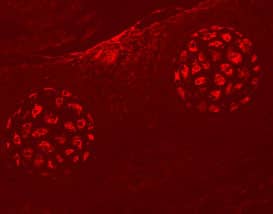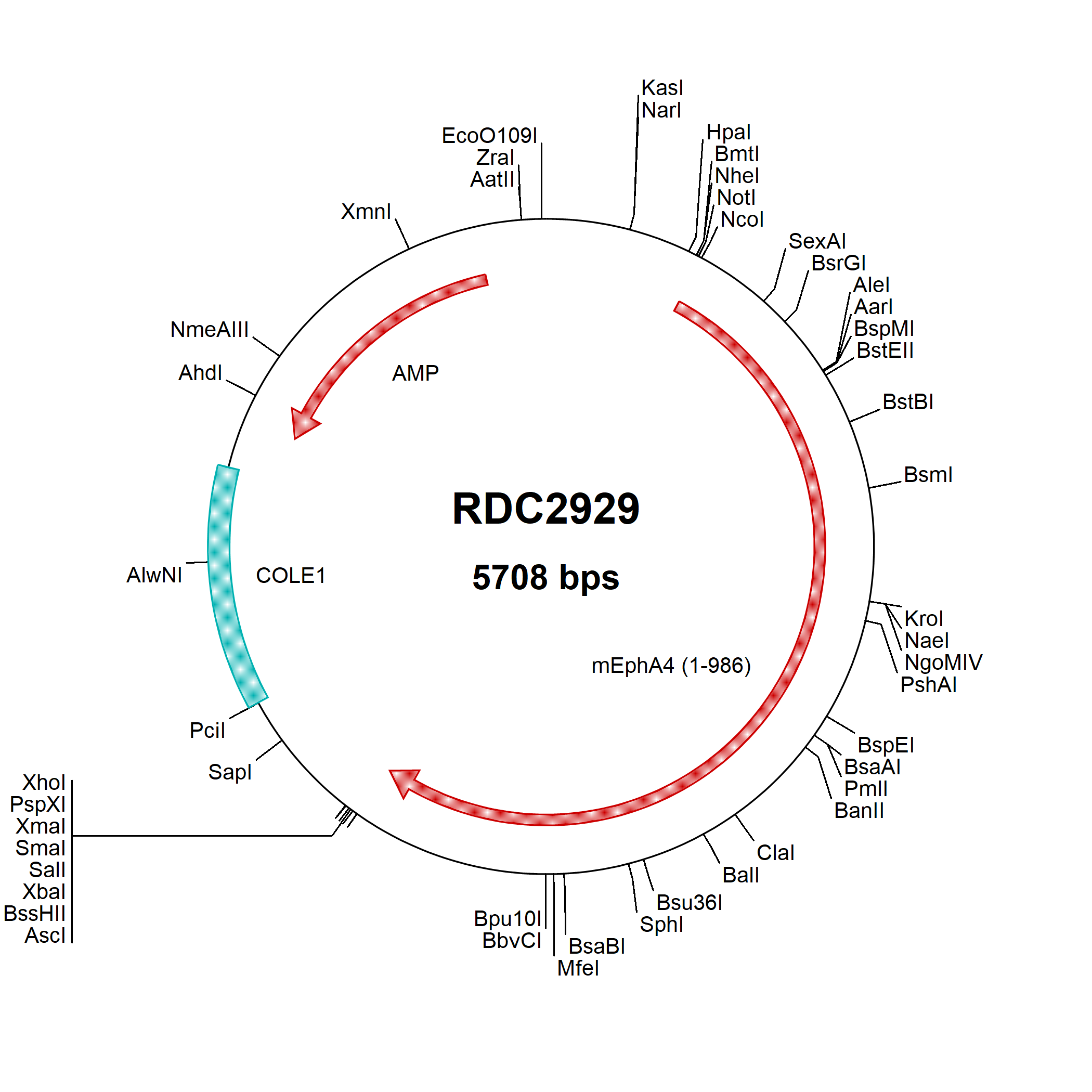EphA4 Products
Cell migration is influenced by chemodirectants including a large family of receptor tyrosine kinases collectively referred to as Ephs. Ephs are divided into two classes based on their extracellular structure and ligand specificity. Eph receptors that bind preferentially to ephrin-A ligands are referred to as EphA. All Eph receptors contain an extracellular region consisting of a globular domain, a cysteine-rich domain, and two fibronectin type III domains. This is followed by the transmembrane region and cytoplasmic region. The cytoplasmic region contains a juxtamembrane motif with two tyrosine residues, a kinase domain, and a conserved sterile alpha motif (SAM) in the carboxy tail with one conserved tyrosine residue.
40 results for "EphA4" in Products
40 results for "EphA4" in Products
EphA4 Products
Cell migration is influenced by chemodirectants including a large family of receptor tyrosine kinases collectively referred to as Ephs. Ephs are divided into two classes based on their extracellular structure and ligand specificity. Eph receptors that bind preferentially to ephrin-A ligands are referred to as EphA. All Eph receptors contain an extracellular region consisting of a globular domain, a cysteine-rich domain, and two fibronectin type III domains. This is followed by the transmembrane region and cytoplasmic region. The cytoplasmic region contains a juxtamembrane motif with two tyrosine residues, a kinase domain, and a conserved sterile alpha motif (SAM) in the carboxy tail with one conserved tyrosine residue.
| Reactivity: | Mouse |
| Details: | Goat IgG Polyclonal |
| Applications: | WB, IHC |
| Source: | NS0 |
| Accession #: | Q03137 |
| Applications: | Bind |
| Source: | NS0 |
| Accession #: | NP_004429.1 |
| Applications: | BA |
| Reactivity: | Human, Mouse, Rat |
| Details: | Rabbit IgG Polyclonal |
| Applications: | IHC, WB |
| Reactivity: | Human, Mouse, Rat |
| Details: | Rabbit IgG Polyclonal |
| Applications: | WB |
| Reactivity: | Mouse |
| Details: | Goat IgG Polyclonal |
| Applications: | WB |
| Reactivity: | Mouse |
| Details: | Rat IgG1 Monoclonal Clone #107925 |
| Applications: | WB |
| Reactivity: | Mouse |
| Details: | Rabbit IgG Polyclonal |
| Applications: | IHC, WB |
| Reactivity: | Human, Mouse, Rat, Canine, Monkey, +7 More |
| Details: | Rabbit IgG Polyclonal |
| Applications: | IHC, ELISA |
| Reactivity: | Mouse |
| Details: | Rat IgG1 Monoclonal Clone #11C13 |
| Applications: | IHC, WB |
| Reactivity: | Human, Monkey, Primate |
| Details: | Rabbit IgG Polyclonal |
| Applications: | IHC |
| Reactivity: | Human, Mouse |
| Details: | Mouse IgG1 kappa Monoclonal Clone #6H7 |
| Applications: | WB, ELISA |
| Reactivity: | Human |
| Details: | Mouse IgG1 kappa Monoclonal Clone #5A9 |
| Applications: | WB, ELISA |
| Reactivity: | Mouse |
| Details: | Rat IgG1 Monoclonal Clone #11C13 |
| Applications: | IHC, WB |
| Reactivity: | Mouse |
| Details: | Rat IgG1 Monoclonal Clone #11C13 |
| Applications: | IHC, WB |
Contains 4 membranes - each spotted in duplicate with 49 different RTK antibodies
EphA4 kinase inhibitor; neuroprotective
| Purity: | ≥95% (HPLC) |
| Reactivity: | Mouse |
| Details: | Rat IgG1 Monoclonal Clone #11C13 |
| Applications: | IHC, WB |
| Reactivity: | Mouse |
| Details: | Rat IgG1 Monoclonal Clone #11C13 |
| Applications: | IHC, WB |
| Reactivity: | Mouse |
| Details: | Rat IgG1 Monoclonal Clone #11C13 |
| Applications: | IHC, WB |
| Reactivity: | Mouse |
| Details: | Rat IgG1 Monoclonal Clone #11C13 |
| Applications: | IHC, WB |
| Reactivity: | Mouse |
| Details: | Rat IgG1 Monoclonal Clone #11C13 |
| Applications: | IHC, WB |
| Reactivity: | Mouse |
| Details: | Rat IgG1 Monoclonal Clone #11C13 |
| Applications: | IHC, WB |




![Western Blot: EphA4 Antibody [NBP2-16348] Western Blot: EphA4 Antibody [NBP2-16348]](https://resources.bio-techne.com/images/products/EphA4-Antibody-Western-Blot-NBP2-16348-img0006.jpg)
![Western Blot: EphA4 Antibody [NBP2-16347] Western Blot: EphA4 Antibody [NBP2-16347]](https://resources.bio-techne.com/images/products/EphA4-Antibody-Western-Blot-NBP2-16347-img0009.jpg)

![Western Blot: EphA4 Antibody [NBP1-98363] Western Blot: EphA4 Antibody [NBP1-98363]](https://resources.bio-techne.com/images/products/EphA4-Antibody-Western-Blot-NBP1-98363-img0007.jpg)
![Immunohistochemistry-Paraffin: EphA4 Antibody - BSA Free [NB110-39005] Immunohistochemistry-Paraffin: EphA4 Antibody - BSA Free [NB110-39005]](https://resources.bio-techne.com/images/products/EphA4-Antibody---BSA-Free-Immunohistochemistry-Paraffin-NB110-39005-img0003.jpg)
![Immunohistochemistry: EphA4 Antibody (11C13) - Azide and BSA Free [NB110-93604] Immunohistochemistry: EphA4 Antibody (11C13) - Azide and BSA Free [NB110-93604]](https://resources.bio-techne.com/images/products/EPH-Receptor-A4-Antibody-11C13-Immunohistochemistry-NB110-93604-img0002.jpg)
![Immunohistochemistry-Paraffin: EphA4 Antibody - BSA Free [NB110-39007] Immunohistochemistry-Paraffin: EphA4 Antibody - BSA Free [NB110-39007]](https://resources.bio-techne.com/images/products/EphA4-Antibody---BSA-Free-Immunohistochemistry-Paraffin-NB110-39007-img0002.jpg)
![Western Blot: EphA4 Antibody (6H7) [H00002043-M02] Western Blot: EphA4 Antibody (6H7) [H00002043-M02]](https://resources.bio-techne.com/images/products/EphA4-Antibody-6H7-Western-Blot-H00002043-M02-img0004.jpg)
![Western Blot: EphA4 Antibody (5A9) [H00002043-M03] Western Blot: EphA4 Antibody (5A9) [H00002043-M03]](https://resources.bio-techne.com/images/products/EphA4-Antibody-5A9-Western-Blot-H00002043-M03-img0001.jpg)



